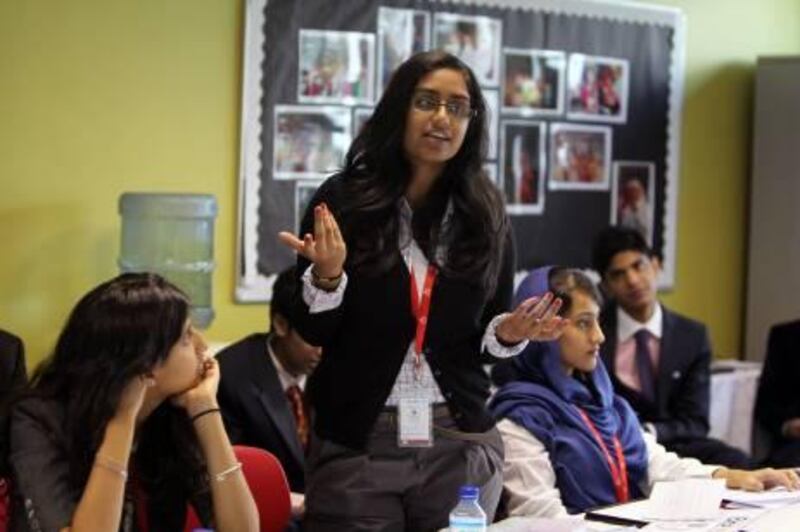DUBAI // The US targets Libyan assets citing human rights abuses, an international argument ensues and China throws a spanner in the works. If it sounds like schoolyard politics, that's because it was.
Teenage delegates representing nine countries gathered yesterday at Dubai International Academy (DIA) for the first session of the three-day Model United Nations Conference, where economic sanctions and military action in Libya were hot topics of debate.
"Libya is getting out of hand and human rights are being abused," warned Sabah Ali, a Year 11 delegate from Emirates International School, speaking on behalf of the US. "A freeze on all the Central Bank and sovereign wealth funds of Libya will put pressure on Qaddafi."
Ms Ali's remarks fuelled an argument in the council, following which China decided to veto the resolution.
"China feels the issue can be solved more peacefully and prosperously, instead of destroying Libya," argued Roshna Bahauddin, also a Year 11 student. "We should not try to deteriorate an entire economy."
The Model United Nations Conference, which runs until tomorrow, gives students the chance to debate the world's most pressing problems, including war, weapons, advancement of technology, and water and sanitation issues.
Abhinav Menon, a Year 10 student from DIA acting as the deputy president of the Model Security Council, said the conference gave students a perspective on real-world problems.
"Libya has been very much on the agenda of the council today and we are reviewing the impact of the sanctions imposed on the country," he said. The school's event is affiliated with The Hague International Model United Nations Conference, which is accredited by the real UN.
Now in its third year, the student-led event had become an international collaboration, said Amay Bhojani, a Year 11 student and deputy secretary general of the Model UN.
"As students take on the roles of delegates from countries that are not their own, it allows them to look at various perspectives and, at the same time, improves our social and public speaking skills," he said.
Aman Ghose, a Year 13 student at DIA and seasoned participant who once served as vice president at a Model UN conference in Singapore, said the process helped the students develop their critical thinking. "These sessions force you to evaluate all sides of an issue to form holistic opinions and not just take in what the media or certain people say."
While representatives of the Model Security Council's permanent five nations - China, France, Russia, the UK and the US - put forward their views on the Libyan issue, a Model UN General Assembly convened at the other end of the school to draw up their own agenda.
Ayla Naeem, 17, from Cambridge International School in Doha, drafted a resolution with her compatriots about the monitoring of naval legislation, which was presented to the chairman later that day.
"We are backed by 18 countries and are cross-referencing with other committees as well," said Ms Naeem, who represented France and was lobbying delegates representing the US.
She said it was her first time at the conference and described it as a great platform to meet peers from other countries. "The amount of research that goes into this and the people we meet opens up opportunities to learn about others cultures, traditions, their history and helps us better understand the world's problems."
Poonam Bhojani, the director of the DIA, said participation helped build the students' personalities.
"Students learn about diplomatic relations and create action plans on how the world should progress forward," she said. "Their experiences have made the students more responsible citizens and have also given them a clearer picture of what careers they should pursue."






